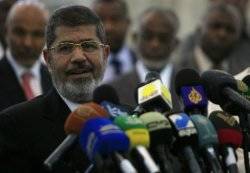Egypt's President Mohamed Morsi has announced that there will be a wide-ranging cabinet reshuffle, but critics say the move is unlikely to meet opposition demands for a complete overhaul of the government.
In an exclusive interview with Al Jazeera on Saturday, Morsi announced the reshuffle, saying that it will involve a number of "key ministries".
"Government restructuring is not an end, it is a means to achieve public interest," Morsi told Al Jazeera.
"So, we will soon see a reshuffle that will include a number of key ministries, mainly to achieve public interest and to react to the changes we face and the problems that arise."
A senior presidential aide has said that the changes to the government will be "wide-ranging" and include provincial governors, according to the AFP news agency.
"The ministries that will be affected include some important ones," he added. "I can't mention which ones because, as you know, this is a sensitive matter."
Sacking demand
Al Jazeera's Anita McNaught, reporting from Cairo, said there are few details available about the reshuffle, but that it is unlikely to satisfy the government opposition.
"Basically, his critics are saying that his cabinet is not up to the job in total and that they need more competent, more experienced people on the job," she said.
Morsi has repeatedly declared his confidence in Prime Minister Hisham Qandil, whose sacking is demanded by a coalition of opposition groups as a condition for dropping a boycott of parliamentary elections, possibly later this year.
Egyptian newspapers have reported that Morsi may replace Justice Minister Ahmed Mekki and other less-prominent ministers.
The opposition remains steadfast in its demand for a national unity government, in a protracted deadlock with Morsi that has delayed a much needed $4.8bn loan from the International Monetary Fund.
Morsi insists it is up to the next parliament to form a new government.
IMF loan
Qandil's government, appointed after Morsi's election in June, has tried to cope with a hemorrhaging economy despite billions of dollars in aid from energy-rich Qatar and some other countries.
The government says unemployment, a main grievance among young protesters who helped overthrow president Hosni Mubarak in early 2011, has risen since the uprising, while foreign investments and tourism revenues have shrunk.
The Egyptian pound, meanwhile, has dropped by roughly 10 percent to the dollar since December as Qandil's government tries to negotiate the IMF loan it hopes will restore investor confidence in the often restive country.
The loan had been delayed after a wave of protests last winter following Morsi's assumption of extensive powers. Morsi was forced to cancel tax increases, part of the economic reforms demanded by the IMF, to ward off further unrest.
The presidency is expected to unroll cuts to fuel subsidies by next fall, reforms that could possibly stoke an increase in prices and further unrest.
Morsi's supporters have argued that frequent protests, which devolve in clashes with police, are a main obstacle to the country's economic recovery.
PHOTO CAPTION
Egyptian President Mohamed Morsi speaks during a press conference on April 5, 2013.
Aljazeera


 Home
Home Discover Islam
Discover Islam Quran Recitations
Quran Recitations Lectures
Lectures
 Fatwa
Fatwa Articles
Articles Fiqh
Fiqh E-Books
E-Books Boys & Girls
Boys & Girls  Hajj Rulings
Hajj Rulings Hajj Fatwas
Hajj Fatwas














